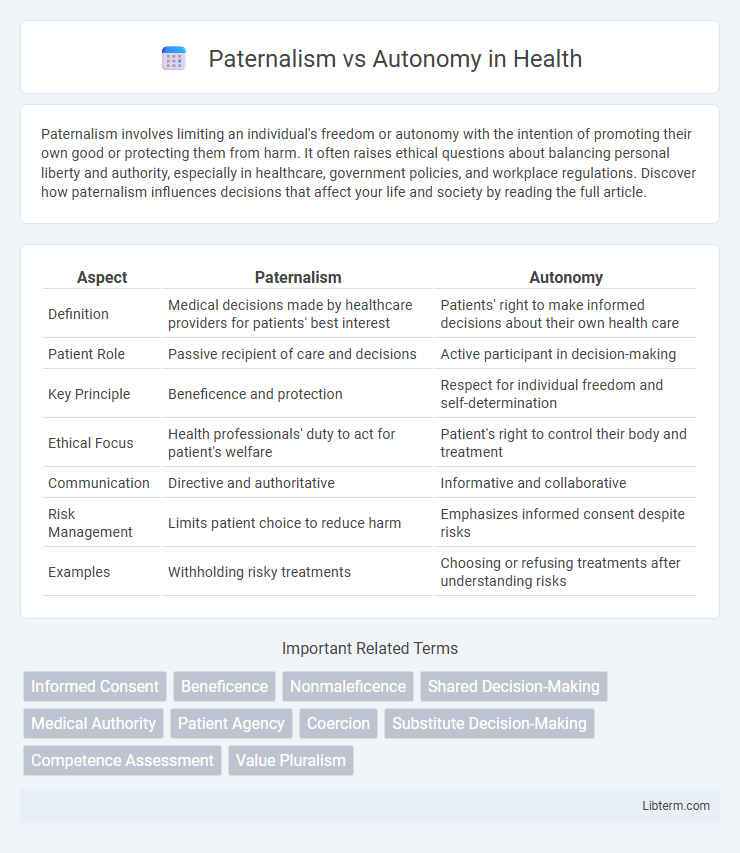Paternalism involves limiting an individual's freedom or autonomy with the intention of promoting their own good or protecting them from harm. It often raises ethical questions about balancing personal liberty and authority, especially in healthcare, government policies, and workplace regulations. Discover how paternalism influences decisions that affect your life and society by reading the full article.
Table of Comparison
| Aspect | Paternalism | Autonomy |
|---|---|---|
| Definition | Medical decisions made by healthcare providers for patients' best interest | Patients' right to make informed decisions about their own health care |
| Patient Role | Passive recipient of care and decisions | Active participant in decision-making |
| Key Principle | Beneficence and protection | Respect for individual freedom and self-determination |
| Ethical Focus | Health professionals' duty to act for patient's welfare | Patient's right to control their body and treatment |
| Communication | Directive and authoritative | Informative and collaborative |
| Risk Management | Limits patient choice to reduce harm | Emphasizes informed consent despite risks |
| Examples | Withholding risky treatments | Choosing or refusing treatments after understanding risks |
Understanding Paternalism: Definition and Types
Paternalism refers to the practice where authority restricts or directs an individual's autonomy, aiming to protect or benefit them, often justified by concerns for their welfare. It is commonly categorized into soft paternalism, which intervenes only when individuals are unable to make informed decisions, and hard paternalism, where interference occurs despite the person's capacity for self-determination. Understanding these types clarifies the ethical tensions between safeguarding well-being and respecting personal freedom in various social and medical contexts.
The Principle of Autonomy: Foundations and Importance
The principle of autonomy emphasizes an individual's right to self-governance and informed decision-making, rooted in respect for personal freedom and moral agency. It is foundational in bioethics, law, and healthcare, underscoring the importance of informed consent and voluntary choices to preserve human dignity. Autonomy ensures ethical interactions by recognizing persons as capable agents responsible for directing their own lives without undue interference.
Historical Context: Evolution of Paternalism and Autonomy
The historical evolution of paternalism and autonomy reflects significant shifts in societal values and legal frameworks, with paternalism rooted in Enlightenment-era governance prioritizing protection over individual freedom. Autonomy gained prominence through 19th and 20th-century philosophical discourse, emphasizing self-determination and personal rights, particularly influenced by Kantian ethics and the rise of human rights movements. This transition marks a crucial paradigm shift from collective control to individual empowerment in modern legal and ethical systems.
Key Ethical Theories Influencing the Debate
Paternalism and autonomy are central themes in ethical theory, prominently explored through deontological and utilitarian perspectives. Deontology emphasizes respect for individual autonomy, arguing that individuals have inherent rights to make their own decisions without external interference. Utilitarianism, however, supports paternalistic actions when outcomes maximize overall well-being, even if it compromises personal freedom, highlighting the tension between collective good and individual rights in ethical debates.
Paternalism in Healthcare: Balancing Protection and Choice
Paternalism in healthcare involves healthcare professionals making decisions for patients to protect their well-being, often justifying overriding patient autonomy. This approach raises ethical challenges, as it requires balancing the duty to prevent harm with respecting patients' rights to make informed choices about their own bodies. Effective paternalism seeks to protect vulnerable patients while promoting autonomy through shared decision-making and transparent communication.
Legal Perspectives: Rights, Consent, and State Intervention
Legal perspectives on paternalism versus autonomy center on balancing individual rights with state intervention aimed at protecting public welfare. Courts often emphasize the importance of informed consent as a fundamental legal requirement safeguarding personal autonomy while permitting limited paternalistic actions in cases of incapacity or significant harm risk. Statutes and case law reflect ongoing debates over the extent to which the state can override personal freedoms to impose restrictions or obligations in healthcare, privacy, and safety regulations.
Societal Impacts: Autonomy in Modern Democracies
Autonomy in modern democracies promotes individual freedom, enabling citizens to make informed decisions and participate actively in governance, which strengthens social trust and accountability. Limiting paternalism reduces the risk of state overreach and supports human rights, fostering diverse expressions of identity and belief. Empowering autonomy drives innovation and social progress by encouraging personal responsibility and ethical pluralism within complex societies.
Cultural Factors Shaping Views on Paternalism
Cultural factors play a critical role in shaping perspectives on paternalism, with collectivist societies often prioritizing communal well-being and endorsing paternalistic interventions to maintain social harmony. In contrast, individualistic cultures tend to emphasize personal autonomy and self-determination, viewing paternalism as a limitation on individual freedoms. Variations in religious beliefs, historical experiences, and societal values further influence the acceptance or rejection of paternalistic approaches within diverse cultural contexts.
Case Studies: Real-World Conflicts and Resolutions
Case studies in paternalism versus autonomy often highlight medical ethics conflicts where patient autonomy clashes with healthcare providers' duty to protect. In instances such as informed consent disputes or refusal of life-saving treatment, courts and ethics boards tend to balance individual rights with public safety and benefit. Resolutions typically emphasize shared decision-making models and institutional policies promoting respect for autonomy while recognizing situational paternalism when necessary.
Navigating the Balance: Toward Ethical Decision-Making
Navigating the balance between paternalism and autonomy requires ethical decision-making that respects individual rights while ensuring well-being. Health professionals must weigh the benefits of protective interventions against the importance of honoring patient autonomy and informed consent. Emphasizing collaborative dialogue and shared decision-making fosters trust and supports ethical outcomes in complex care scenarios.
Paternalism Infographic

 libterm.com
libterm.com